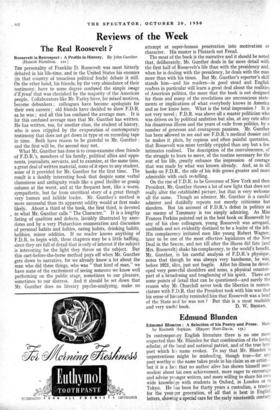Edmund Blunden
IN contemporary English literature there is no one more respected than Mr. Blunden for that combination of the loving scholar, of the local and national patriot, and of the true lyric poet which his name evokes. To .say that Mr. Blunden is unpretentious might be misleading, though true—for any poet worthy of the name takes pnde in his claim as an artist— but it is a fact that no author alive has shown himself more modest about his own achievement, more eager to encourage and advise younger writers, and more willing to share his own wide knowledge with students in Oxford, in London or in Tokyo. He has been for thirty years a custodian, a trustee for the younger generation, of all that is best in English letters, showing a special care for the early nineteenth century and having a particular concern for any writer, at any time, who has understood the ways of the countryside. Circum- stances as well as natural energy have kept Mr. Blunden's pen active—there has, on occasion, been a necessity of application no less pressing than John Clare's. But he has thrived on work and left any complaining to his friends. And while he has worked he has been upholding another valuable English tradition, reaching back to Leigh Hunt and ably forwarded by Mr. Blunden's forerunners on The Times, Sir Bruce Richmond, Harold Child and C. W. Brodribb—the gallant, obstinate tradition that refuses to admit a distinction between jour- nalism and literature.
Notwithstanding the recent success of his Cricket Country and his Shelley, there had been a possible danger that, with his output widely scattered in periodicals and in books published in limited editions or no longer in print, Mi. Blunden might be remembered by the general reader only for his admirable Undertones of War and for a few poems in antholo- gies, such as the ubiquitous " Almswomen. Mr. Kenneth Hopkins's timely anthology disposes of this fear. Within 370 pages, prefaced by a sensible introduction, he has packed a generous and skilfully chosen selection from the many books and occasional papers. Prose predominates, but the two- dozen poems are fully representative, showing that a poet can respect tradition and yet be modern in his method, outlook and choice of theme, old-fashioned only in the sense that it has become old-fashioned to be graceful and intelligible. I par- ticularly welcome the inclusion of the long essays on Collins and Clare and excerpts from that delightful book The Face of England. If there are some little commonplaces and Blunden- r isms, here and there, these are part of the price joyfully paid for a prolific genius. Thus we may read that " Cheerful and free, Chapman joins Duleepsinhji," and that " The libraries of long ago were largely composed of big books because of other than sheerly literary reasons " ; and in the poem " Report on Experience ' there are two lines that I take to be bad, recalling Leigh Hunt when he stumbled. But what does it matter when " The Midnight Skaters " • and " The Author's Last Words to his Students " are only a few pages further on ? Here is a rich book, of which Mr. Blunden may well be proud —not least because it assembles a portrait that the speaking frontispiece confirms, of a lovable character " still achieving still pursuing." It deserves to be bought and to be read and



















 Previous page
Previous page